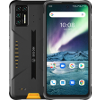Vivo iQOO Z3 vs UMIDIGI Bison GT
Was ist der Unterschied zwischen Vivo iQOO Z3 und UMIDIGI Bison GT. Finden Sie heraus, welches Smartphone die bessere Performance hat.
Performance (Benchmarks)
| 1947 | 3DMark for Android Wild Life | 1429 |
Technische daten / Spezifikationen
| Vivo iQOO Z3 | Produktname | UMIDIGI Bison GT |
| Android 11 | Betriebssystem (OS) | Android 10 |
| Bluetooth WLAN | Drahtlose Technologien | Bluetooth WLAN |
| Yes, Type-C | Interface | Yes, Type-C |
Display
| 2408 × 1080 px | Display Auflösung | 2400 × 1080 px |
| IPS | Displaytechnologie | IPS LCD |
| Yes | Multi‑Touch | Yes |
| 6.58" | Bildschirm-Diagonale | 6.67" |
Prozessor (CPU)
| 2.8GHz single-core Kryo 475Prime, 2.2GHz single-core Kryo 475Gold & 1.8GHz hexa-core Kryo 475Silver | CPU-Architektur | Up to 2.05 GHz dual-core ARM Cortex-A76 & 2.05 GHz hexa-core ARM Cortex-A55 |
| Snapdragon 768G | Prozessor | Helio G95 |
| Adreno 620 | Grafikprozessor GPU | Mali-G76 MC4 |
Kapazität
| 6144 / 8192 / 12288 MB | RAM Speicher | 8192 MB |
| 128 / 256 GB | Interner Speicher (ROM) | 128 GB |
| microSD / microSDHC / microSDXC | Speicher-Erweiterung Details | No |
Kamera
| Yes, 64 MP | Hauptkamera | Yes, 64 MP |
| Yes, 16 MP | Front-Kamera (Selfie) | Yes, 32 MP |
Konnektivität
| varies by model | 2G | varies by model |
| varies by model | 3G | varies by model |
| varies by model | 4G (LTE) | varies by model |
Navigation
| Yes | GPS | Yes |
| Yes | A-GPS | Yes |
Akku
| 4400 mAh | Akku-Kapazität | 5150 mAh |
Sensoren
| Yes | Kompass | Yes |
Gehäuse
| 75.3 / 164 / 8.5 mm | Maße | 82.5 / 170.3 / 12.8 mm |
| 185.5 g | Gewicht | 283 g |

